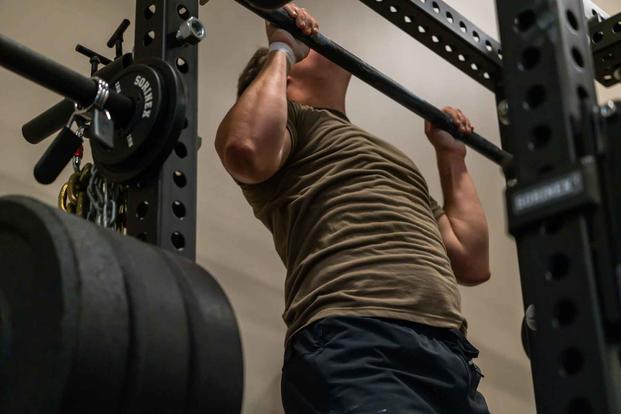Recruits will now be required to deadlift anywhere from 40 pounds to 110 pounds to qualify to join the Air Force and get certain jobs, after the service revised a more than 40-year-old test used to determine new airmen's eligibility for different career fields.
The change is part of the updated Strength Aptitude Test, which had been in place since the 1980s, to evaluate how much weight recruits can deadlift, which requires lifting a weight from the ground to a standing position. The old method tested how much weight they could clean and press, which requires picking up and hoisting a weight overhead.
Gen. David Allvin, who currently serves as the acting chief of staff for the Air Force and is awaiting confirmation for the permanent job, acknowledged the change in testimony submitted to the Senate last month, saying the test was updated "to better reflect the actual demands of the career fields, thus expanding career field opportunities, especially for our female recruits."
Read Next: Troops Suing Defense Department over Vaccine Mandate Reach $1.8 Million Settlement
The change, which went into effect in January, makes the test safer and allows for more gender diversity in many jobs, Air Force Recruiting Service spokeswoman Leslie Brown told Military.com on Tuesday.
It is more in line with Centers for Disease Control and Prevention lifting standards, which "promotes safe techniques while affording individuals an opportunity to lift more weight compared to a traditional clean-and-press movement," Brown said.
The Strength Aptitude Test is conducted on incremental lifting machines found in most fitness facilities and gyms. It was criticized by the Government Accountability Office and nonprofit research groups for decades as being an inaccurate measure of whether someone is physically prepared for a job, as well as for limiting the number of career fields female airmen could join.
A Government Accountability Office report in 1996 recommended that the service "reassess the use of the Strength Aptitude Test as a means of predicting future performance in physically demanding occupations."
GAO officials argued that recruits tend to get stronger during boot camp training, pointing out that many "scored lower during their initial tests than they did when retested during basic military training."
In 1996, "244 females were retested during the second week of basic military training and lifted an average of nearly 18 pounds more than they did initially," according to the GAO report.
A 2018 study from the Rand Corp., a federally funded think tank, brought up similar concerns with the old test.
Rand researchers found that, between 2000 and 2021, "almost all of the men entering the Air Force lift 60 pounds or more, and about 87% of the women also do so."
But they noticed a big split between the genders at 70 pounds, "with almost all of the men and [only] about 70% of women meeting this requirement."
When the weight requirement increased to 100 pounds, only 7% of women could hit the mark compared to 90% of the men.
That discrepancy made many women ineligible for a variety of career fields -- including munitions systems, which requires a minimum lift of 60 pounds; aircraft armament and security forces, which requires 70 pounds; and fire protection, which requires 100 pounds, according to the Rand study.
Since the new test was introduced at the beginning of this year, 4,111 women have taken it, and 1,162 of them qualified for specialties with higher weight requirements, such as aircraft maintenance, security forces, munitions and special warfare, Brown said.
"It has increased our applicant pool, but the most significant impact has been to the job specialty qualifications, which are now more gender diverse," she added.
The change to the Strength Aptitude Test comes in the wake of a variety of reforms the Air Force has been pursuing to address barriers to service. A Pentagon study from 2021 shows that 77% of young Americans would not qualify for military service without a waiver due to being overweight, using drugs, or having mental and physical health problems.
The Air Force missed its active-duty enlisted recruiting goals for the past fiscal year, which ended last month, by roughly 11%. It was the first time since 1999 the service didn't reach its projected numbers.
Other reforms enacted by the service include a pilot program that allows certain applicants who test positive for THC, the psychoactive component of marijuana, a chance to retest; new tattoo policies; and changes to acceptable body fat percentages for new recruits.
-- Thomas Novelly can be reached at thomas.novelly@military.com. Follow him on Twitter @TomNovelly.
Related: Air Force's Marijuana Waiver Program Proves More Popular Among Applicants Than Expected













